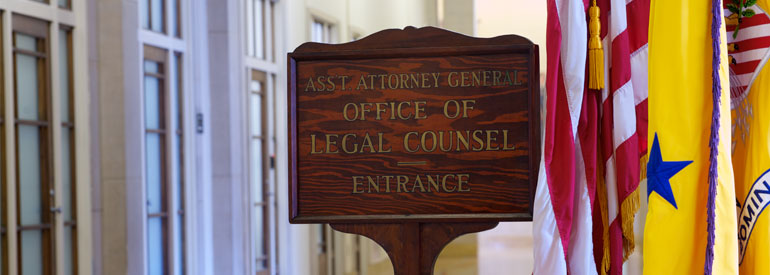Today at 2 PM ET, the Senate Judiciary subcommittee is holding a hearing entitled “The Office of Legal Counsel’s Role in Shaping Executive Privilege Doctrine” with OLC’s Assistant Attorney General Christopher Schroeder as the sole witness.
Given that secrecy is an all-too-common aspect of the OLC’s work, and that its secrecy has at times undermined the rule of law and the operations of that office, we will be watching for any insights about how the subcmte would promote disclosure of OLC opinions as an antidote. Congress should act now to lock-in transparency of OLC opinions.
This position in favor of transparency was embraced by AAG Schroeder before he was appointed and confirmed to his current role, as well as by a number of attorneys who formerly worked in the Office of Legal Counsel. They have pointed to abuses of the OLC process by that office’s issuing opinions that “arguably distort the separation of powers by brooking no recognition for Congress’s prerogatives as a co-equal branch, in high-visibility disputes with Congress over politically charged legal questions.”
Daniel Schuman, policy director at Demand Progress Education Fund, said: “OLC is a major mechanism by which Congress’s powers are diluted, limited, and ignored. Its opinions should be proactively disclosed to protect our democracy and the rule of law. There is no reason for Congress to wait to move on any of the three off-the-shelf ready-to-go OLC transparency reforms that have bipartisan coalition support.”
Those reforms include:
- authorizing legislation (Demanding Oversight and Justification Over Legal Conclusions Transparency Act or the DOJ OLC Transparency Act, S. 3858, and its companion House bill, the SUNLIGHT Act of 2022, H.R. 7619.
- the Duckworth amendment to the FY2023 NDAA (S.Amdt. 6246 to H.R. 7900);
- the directive in the appropriations committee report (H. Rept. 117-395, p. 59) accompanying the House’s FY 2023 appropriations bill for the DOJ.
And of course, Schroeder could proactively update the OLC’s “Best Practices” memorandum to instate proactive disclosure of OLC opinions without waiting for Congressional direction. Let’s not forget that in 2004, he was one of 18 former senior DOJ officials who signed a document entitled Principles to Guide the Office of Legal Counsel that specifically said: “OLC should publicly disclose its written legal opinions in a timely manner, absent strong reasons for delay or nondisclosure.”
Also, don’t miss the American Constitution Society’s Statement on OLC opinions, to which many former OLC attorneys contributed, that identifies many problems with OLC’s non-transparency practices — including harm to the office itself — and recommends “the Office should demonstrate its commitment to ensuring executive branch accountability through transparency by articulating a strong presumption in favor of publishing its final formal opinions.”
When Schroeder was a nominee in 2021, Demand Progress led a bipartisan coalition including Americans for Prosperity, the National Taxpayers Union, and the Federation of American Scientists that called for the OLC to adopt a policy of proactively disclosing OLC opinions. We’ve also testified to the Senate requesting OLC transparency language be included in the CJS Approps subcommittee bill — such language was included in the House; and the pending Duckworth-Leahy DOJ OLC Transparency Act.
Today’s hearing is described as focusing on the Executive branch’s views on the executive privilege doctrine, and is reportedly a follow-up to the previous executive privilege hearing in August 2021, during which several witnesses pointed to the OLC as the primary driver of executive privilege doctrine in the Executive branch and identified OLC as partly responsible for the increasingly aggressive legal positions the Executive branch has taken to thwart Congressional oversight in recent years.
